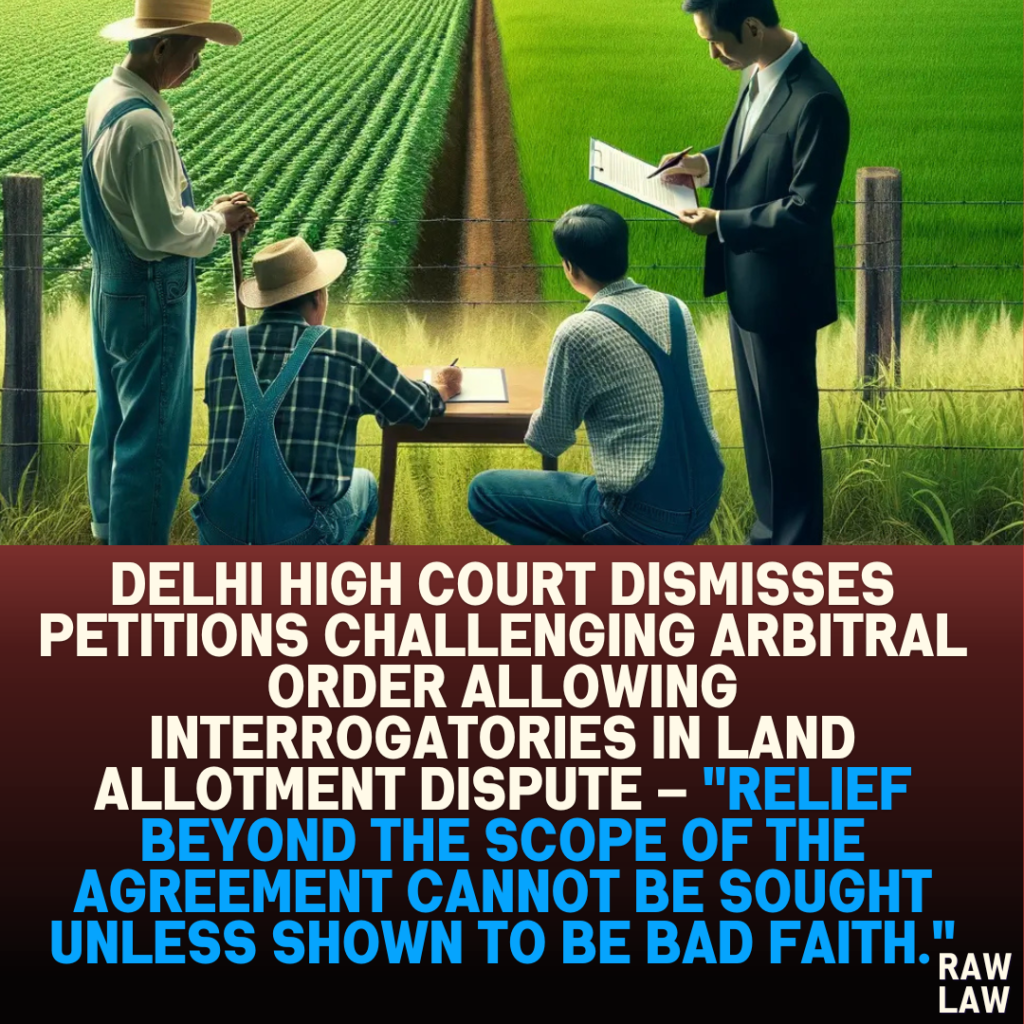Court’s Decision:
The Delhi High Court dismissed the petitions challenging the order of the Sole Arbitrator, which permitted certain interrogatories and discovery applications. The court observed that the order passed did not go beyond the scope of the arbitration agreement and was necessary for the fair adjudication of the matter. The court reiterated that its scope of interference under Article 227 of the Constitution is extremely limited and only warranted in cases of “exceptional rarity” or “bad faith,” which was not demonstrated in this case.
Facts:
- The petition involved two agreements between the parties for the allotment of plots in a township project in Ghaziabad, Uttar Pradesh.
- The seller (Petitioner) was to develop the township project under a consortium arrangement with the Ghaziabad Development Authority (GDA) registered as the ‘Private Developer’.
- Disputes arose when the buyer (Respondent) alleged that despite making payments, possession of the plots was not offered, and the seller concealed the actual project status.
- The buyer invoked arbitration, seeking execution of the transfer deed, or alternatively, compensation for the breach of agreement.
- The seller contended that the agreements stood frustrated as the necessary land was not acquired by the governmental authorities, leaving them unable to fulfill the contract.
- During the arbitral proceedings, the buyer filed applications for leave to deliver interrogatories and production of documents.
Issues:
The main issue in contention was whether the Sole Arbitrator’s decision to permit interrogatories and document discovery exceeded the scope of the agreement, and if such an order should be set aside under Article 227.
Petitioner’s Arguments:
- The seller argued that the arbitral order permitted relief beyond the terms of the agreement, which explicitly excluded other plots from the buyer’s rights.
- It contended that the arbitrator lacked jurisdiction to grant interrogatories or production of documents for other plots since the agreement barred the buyer from claiming any interest in these plots.
- The seller asserted that such interrogatories were not connected to the dispute and the order caused prejudice.
Respondent’s Arguments:
- The buyer argued that it sought information regarding the status of unsold plots to substantiate its claim for specific performance or alternative relief.
- It maintained that the information sought was crucial to establish the availability of similarly situated plots in the same project, a point already raised by the seller.
Analysis of the Law:
- The court highlighted that judicial interference under Article 227 is only justified in cases where there is “patent lack of jurisdiction” or the orders reflect “bad faith” or “exceptional circumstances.”
- It further emphasized that the scope of the arbitrator’s authority is to be construed in light of the agreement and the conduct of the parties.
Precedent Analysis:
The court referred to various precedents, including:
- Puri Investments v. Young Friends and Co. and Others (2022 SCC OnLine SC 283): Emphasized the narrow scope of judicial review in arbitral matters.
- Estralla Rubber v. Dass Estate (2001) 8 SCC 97: Reinforced the restrictive scope of interference under Article 227.
Court’s Reasoning:
- The court reasoned that since the seller had itself offered alternate plots during the pendency of the arbitration, it could not now claim that interrogatories seeking information on other plots were beyond the agreement’s scope.
- The buyer was merely seeking information without claiming any substantive rights in the other plots. Thus, the interrogatories were not in the nature of a “fishing inquiry.”
Conclusion:
The petitions were dismissed, with the court holding that there was no jurisdictional error in the arbitral order. The arbitrator acted within the bounds of the agreement, and the orders did not suffer from “perversity” or “bad faith.”
Implications:
The judgment clarifies the limited scope of judicial review under Article 227 in the context of interlocutory orders passed during arbitration. It also underscores that parties cannot selectively invoke agreement clauses to restrict disclosure obligations that they themselves have acknowledged during the proceedings.
